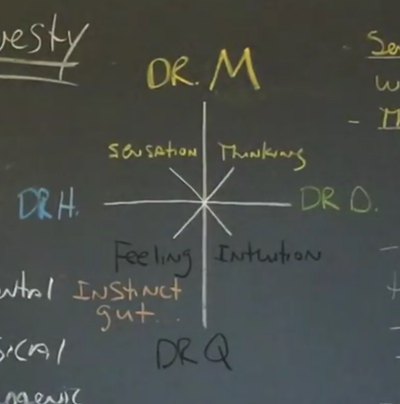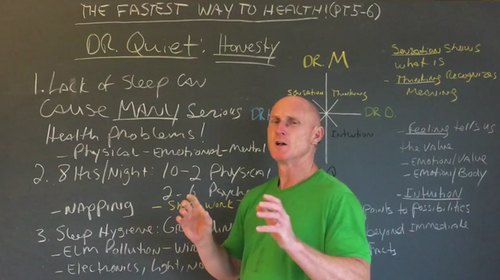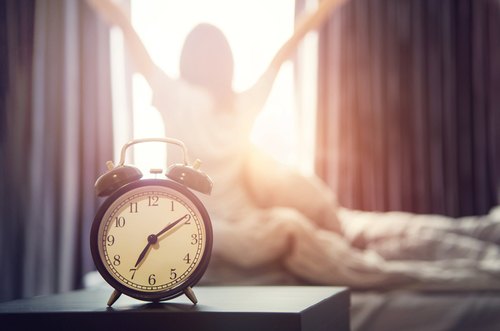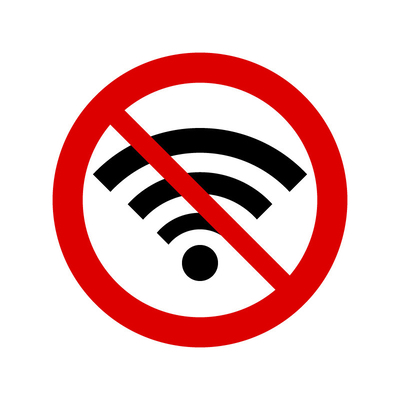The Fastest Way to Health Part 5

Throughout this series, I’ve reminded you the fastest way to health starts with embracing one important concept: Being honest with yourself.
Honesty gets you past the “I don’t knows” that many of my clients typically say when I ask them why they keep making bad health choices.
As this series has moved forward, you’ve started to build a foundation for figuring out some of these problems. For part 5 of my vlog series (last time we talked about Dr. Diet), we’ll take on the essentials of Dr. Quiet, which may challenge your approach to sleep.
- Do you take sleep seriously?
- Do you pay attention to your sleep times and surroundings?
- Do you spend enough time sleeping every night?
- Do you take steps to protect your health and body so that a good night’s sleep is possible?
Sleep problems
First of all, the lack of sleep can cause many serious health problems. Fact is, the statistics are quite alarming about how many people are sleep-deprived. (There’s research that showed the average college student is getting 4.5-5 hours of sleep per night.)
Sleep deprivation can create serious deficits that lead to a long list of problems ranging from cognitive disorders and workplace issues to significant physical issues and hormonal imbalances which create blood sugar issues and spur weight gains.
Among the emotional problems a lack of sleep causes: Mood swings, aggressiveness, negativity and depression, not to mention cognitive disorders that affect your ability to process information.
It’s not at all surprising that sleep deficits are so common, given the computers, televisions, tablets and phones that surround us all the time.

Looking at research on sleep, your body is very sensitive to photons. Our bodies just aren’t designed to be exposed to a lot of light after the sun goes down.
Our bodies have been evolving for a very long time. We’re the tip of the evolutionary sword, meaning we started as single-celled organisms billions of years ago and progressively developed and lived by the natural day/night cycles driven by the sun.
Unfortunately, our modern society has made very rapid technological changes without regard to how our bodies may be affected by them.
So, as we’re learning to be more honest with ourselves, we must recognize how critical it is for us to manage our sleep in order to become healthier.
The 8-hour rule
As a general rule, people need 8 hours of sleep per night. I’ve met very few people who can function well and have mental clarity, good health, a healthy sex drive and a high level of creativity and not get at least eight hours of sleep a night most of the time.
Inevitably, life can throw surprises at you. A baby will throw new parents into sleep deprivation mode for a while. It can be hard on them and on their relationship due to the stress, emotional reactions and mental confusion. (According to a recent study I reviewed, new Moms may become so sleep-deprived that their brains actually shrink due to neuron death as a result of sleep deprivation.)
My training in functional medicine testing with Dr. William Timmons, founder of BioHealth Diagnostics, plus studies from other sources suggest that our body has a physical repair cycle (10 p.m.-2 a.m.) and a psychogenic (brain, nervous system) repair cycle (2-6 a.m.).

I’ve monitored countless patients since 2000 and found clear indicators that people who are skipping the physical repair cycle – particularly if they’re athletes – start experiencing physical problems. They don’t recover as quickly from exercise and they experience many more nagging injuries too.
When people skip the psychogenic cycle, they start having more mental, emotional and cognitive problems. For example, people can stop dreaming, which is so very important to integrate our psyche and mental functions.
Some researchers describe dreaming in a way that’s very much like defragmenting the hard drive on a computer. When we don’t give ourselves enough time for that defragmenting process, our mind stops being integrated. This can show up as a lot of symptoms. Three very common ones are attention deficit behaviors, anxiety and depression.
In my book, How to Eat, Move and Be Healthy!, I recommend that you should have your head hit the pillow at the latest by 10:30 or you’re cutting too deeply into that physical repair cycle.
For most people, after the 10:30 mark, the body begins to tire, triggering elevated cortisol levels. Shortly after that, you may not fall asleep very well and you won’t achieve a deeper sleep because you have too much cortisol in your system.
It’s also very important to sleep in a darkened room, whether that means taping curtains, covering windows and shutting off electronics with lights on them.
Napping can be very helpful too. A good amount of research suggests that you can’t recover lost sleep, but napping is about the best you can do. I’ve used this a lot in my own life and coached lots of people with it for many different reasons, including those who do shift work.
An important tip: Generally, you don’t want to nap more than 20 minutes, or your body will fall into a hibernation state and you won’t fully awaken (your body will want to sleep).
You’ll also see this with people experiencing jet lag. They try to counter this problem with stimulants which triggers a greater cascade of problems.
Each of us has a different capacity to adapt to shifting time zones. Our internal clock is set to the place we were born. Some of us can move to other places and eventually adapt. In my opinion, however, it’s typically a chronic, long-term stressor.
Regarding shift work, most people cannot handle more than two to three weeks of shift work that disrupts the normal 10 p.m-6 a.m. sleep cycle before they start experiencing significant physical, emotional and mental health problems.
Sleep hygiene
 One of the most important and very helpful things you can do to improve your sleep hygiene is to use a grounding mat (look for one on Earthing).
One of the most important and very helpful things you can do to improve your sleep hygiene is to use a grounding mat (look for one on Earthing).
Grounding mats bleed the electromagnetic pollution from your body and into the earth or the grounding port in a wall socket. Using them can have a huge effect on lessening the chronic inflammation along with joint, hormonal and cognitive problems in your body.
Also, keep in mind our buildings are full of electronics. Any time you have problems getting quality sleep, you should unplug every electronic thing in your room.
Why? Many modern electronics have ready-on circuits so their internal workings never really shut down, although their screens and sound typically do, so they produce electromagnetic pollution all night long.
If you need an alarm clock, put your mobile phone on airplane mode and keep it away from your bed or use a windup clock.
Wireless systems can also cause tremendous problems. In previous vlogs, I’ve mentioned a very bad neck injury I suffered about a decade ago when I tore ligaments in my spine, blew two discs out and experienced spinal cord compression.
I used to have numbing in my arm and neck pain all night long. I’d roll over so much at night I’d wear holes through bedsheets.
One day, I wondered if shutting down our wireless system off in the house would help at night. When we did, I had the first deep sleep I’d experienced in a very long time, didn’t recall rolling over and felt tremendously better, plus my symptoms were reduced too!
Recently, I did a vlog about belly button rings, earrings and nose rings where I talked about Nicholas Pineault’s book, The Non-Tinfoil Guide to EMFs: How to Fix Our Stupid Use of Technology, that offers many suggestions for protecting yourself from electromagnetic fields (EMFs).
If you do a lot of traveling, live in an apartment building or work in an office and can’t control the environment around you, I recommend an Aires Tech device. It can make a great difference in how you feel. (Use the code CHEK10 at the Aires website to save 10 percent.)
Noise and light pollution can be problems too. If you have to get a pair of comfortable earplugs or a sleep mask, do what you have to do. These options are far cheaper than having health challenges in the long run.
More resources for you
So many people come to me with their health problems when their lives are falling apart, yet they tell me why they don’t need eight hours of sleep every night,
Too many people are so trapped in their intellect that they’re not paying attention to their sensations or feelings or even using their intuition or instincts, critical tools that help us be healthy.
I hope you enjoy watching part 5 and that you’re learning how important it is to be honest with yourself when it comes to your health.
If you haven’t had time to watch the previous four parts of this series, take some time to catch up. It’s a lot of information to absorb, but it will help you going into part 6 where I’ll show you how to integrate these concepts and apply them in your life.
I go into more detail about Dr. Quiet in The Last 4 Doctors You’ll Ever Need and there’s a very comprehensive chapter on sleep in How to Eat, Move and Be Healthy!.
If you want more knowledge, consider taking my CHEK Holistic Lifestyle Coach Level 1 course which you can do live over three days, or online with or without an instructor.
Love and chi,
Paul